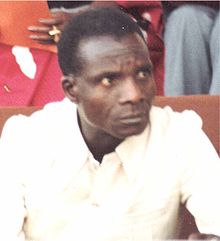Seyni Kountché
Seyni Kountché (born July 1, 1931 in Fandou Béri , † November 10, 1987 in Paris ) was head of state of Niger from 1974 to 1987 .
soldier
Kountché joined the French army in 1949 and served in the Indochina War and later in the Algerian War . In 1957 he became a sergeant . After Niger gained independence from France on August 3, 1960, he joined the army in 1961 . From 1965 to 1966 he attended an officers' school in Paris and later became deputy chief of staff, in 1973, now lieutenant colonel , chief of staff of the army.
president
On April 15, 1974, Kountché led the military coup against the authoritarian ruling President Hamani Diori . The constitution was suspended, parliament dissolved, all political parties banned and opponents of the old president released from prisons or allowed to return from exile . He promised to stimulate the economy and to distribute international aid fairly because of the famine that plagued Niger and the rest of the Sahel region .
Foreign policy
In terms of foreign policy, like his predecessor, he relied on good relations with France, and he also strengthened contacts with the Arab states and the People's Republic of China . Relations with Libya were strained because of Libya's alleged support for insurgent Tuaregs , and there were several skirmishes on the common border. In the 1980s he supported Chad in its conflict with Libya . The United States became the most important donor country for development aid during his tenure, and in December 1984 he visited President Ronald Reagan in Washington .
Domestic politics
Under the catchphrase "Development Society", Kountché tried to embark on a specially African and independent development path for Niger, which should not be based on western or eastern systems. While the military government, into which civilians were also admitted, kept the country firmly under control, so-called “development councils” were established at local and regional level, in which the population could participate in decision-making on development policy measures. The traditional chiefs as well as the self-help organization "Samariya" were able to expand their influence and both became an important pillar of the government. Kountché's priority projects were the fight against corruption and the self-sufficiency of Nigerians with basic foodstuffs.
In 1976 and 1983 attempts to overthrow him failed. From 1981 he made efforts to give the country a new constitution and civilians to participate in government. On January 24, 1983, he named Mamane Oumarou, a civilian prime minister. However, power in the country remained with the Supreme Military Council ( Conseil militaire suprême / CMS), which had been operating since 1974 . Kountché himself also held the post of interior minister from 1974 to 1976 and from 1981 to 1987 and from 1974 to 1976 and from 1977 to 1987 the post of defense minister . Kountché, who was also known as the “ Prussian of Africa”, was one of the continent's military dictators who tried to achieve real development in their countries, although his successes were limited.
death
In 1986, Kountché's health deteriorated. He died of a brain tumor in a Paris hospital . The CMS appointed Colonel Ali Saibou as his successor.
Others
The National Development Movement Party (MNSD-Nassara) invokes, among other things, Kountché's political legacy. The football stadium in the capital Niamey is named General Seyni Kountché Stadium in his honor .
| personal data | |
|---|---|
| SURNAME | Kountché, Seyni |
| BRIEF DESCRIPTION | Nigerien politician, President of Niger (1974–1987) |
| DATE OF BIRTH | July 1, 1931 |
| PLACE OF BIRTH | Fandou Béri |
| DATE OF DEATH | November 10, 1987 |
| Place of death | Paris |
